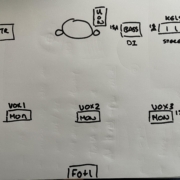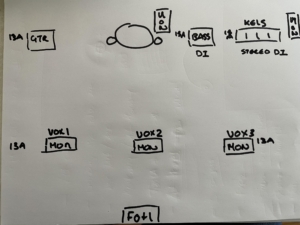16 Tips for Writers by Jennifer Davidson
 1. Think of yourself as a businessperson as much as a creative.
1. Think of yourself as a businessperson as much as a creative.
Sometimes we can sometimes get lost between those two identities: artists and businesspeople. It’s a commercial world and we need to find our way of feeling comfortable in that world. Consider the question: Are you solving a problem for somebody?
2. Know your value, creatively.
If you’re writing for stage or screen, keep reminding yourself of how important you are to the process. What are you going to accept as payment for your work? You want the best offer.
3. Know your audience.
This includes producers and other collaborators, broadcasters, publishers, script editors. Who are the people that resonate with you? Or that you feel your work resonates with?
If you have time, think about your customer persona, almost like writing a character biography. Who is that producer you want to work with? For example…
Is it a woman in her 40s who is a massive horror film fan? Maybe she is incredibly busy working during the day but always makes time for her dogs and her cinema dates.
Don’t waste your time with people who you don’t want to work with. Writers need that clarity about who we’re writing for.
4. Focus.
Find the sweet spot between the three following questions.
What are you deeply passionate about?
What can you be the best in the world at?
What drives your economic engine, i.e., what work gets you the highest possible fee as a writer?
5. Trust yourself.
Trust the stories that you want to tell. Often they’re the kind of stories that you like to read yourself. Also don’t be afraid to experiment with different genres so that you can be sure you’ve found the best one for you. That doesn’t mean that you’ve got to stick with the same genre forever.
6. Know your economic value.
Part of knowing your economic value is talking to other writers or talking to the Writers Guild of Ireland. If someone offers you a price for your work, have a look and say, “I’ll come back to you”. Always ask for more than the initial figure you had in mind.
7. Accept you’ll not always be switched on.
There are going to moments and sometimes months, maybe even years where it’s not always going to be happening for you creatively.
To avoid burnout, look at your 12-month plan rather than month to month. What month is slowest for you that you can afford to take off, to recalibrate and enjoy?
8. Writers need other people.
While we might mostly work in isolation, we really need other people to spark ideas. There’s nothing better than sitting in a café and eavesdropping in on other conversations to get some inspiration.
9. The board you can’t afford.
When you’re a fully-fledged business, you can afford to have a board of advisors. Until you get to that point, who are the people that you can talk to as your sounding board? People who have expertise that maybe you don’t have; your peer network. Perhaps a producer or a dramaturg, people you were in college with, or did a course with. Or maybe you met them at a festival.
Make sure that group of people are the right people for you. You’ll know pretty quickly who’s a good match, and who isn’t. You don’t want people to tell you that everything you’ve written is brilliant. You want constructive criticism, constructive feedback, people who can give you support re. where you are in your business. Someone who can empathise with you when you’re not hitting your goals.
You want those people who will say your name in a room when asked, does anyone know a good writer? Have your accountability people. People in the business who are going through it with you.
10. Creative thinking time.
This is an important part of the process. Your work is not just about the physical time it takes you to write the script, it’s the time to think of the idea, feel inspired, outline the idea.
It’s important to have something in your back pocket if an agent, producer or publisher says, “I love this, what else are you working on?”
Within your week carve out half an hour of fun, creative thinking time where you’re coming up with creative ideas as opposed to focusing on money-making ones. Even if it’s 15 minutes every morning. Put that time in your schedule, it’s non-negotiable.
11. To get an agent or not to get an agent…
In Ireland you do not need an agent. There are disadvantages to it being a small industry here but there are advantages too. You can bump into people at festivals. While they can’t take unsolicited ideas, you can strike up a relationship with them. Suss them out, are they the type of people you want to work with?
If you have some success, maybe you’ve won an award or you’ve made a short film, let people know.
If you’re looking at working in the UK or going to the streamers, then you need an agent because it’s a bigger market. You need to have sample scripts before you go and approach an agent. Make sure they’re really, really good because you only have one shot.
Look at who the writers are in the UK, who do you like? Find out who their agent is. Strike up a relationship with them or their assistants because they are the ones building the lists and perhaps looking to establish themselves as agents. It’s a very slow process. There are lots of variables. You’ve got to be patient.
12. It is rarely about you.
When someone doesn’t come back to you, it’s rarely about you. You’ll feel the sting, but don’t let that get in your way or put you off. Understand that rejection is usually just a numbers game. Maybe they have someone on their books who is too similar to you.
13. A good fit.
Before approaching a producer or an agent, know what they do. You want to make sure that they’re producing the kind of stuff that you’re writing. It’s a long haul when you’re working with a producer, publisher or a production company. You want to make sure that you can work together when you’re at your best and when you’re at your worst.
14. Imposter syndrome?
Sometimes this is not a great description to use as the feeling you have is rarely down to you, it’s more about the space you find yourself in. If you’re not the default, then the space perhaps wasn’t designed for you. That feeling your having is usually a result of something that is larger and more systemic. Once you realise that, you can get out of your own way.
15. Say no.
It’s ok to say no to a producer or publisher. You don’t have to say yes to the first one who shows an interest. It’s OK to say no to a bad contract. Get contract advice. Producers are terrible at sending a contract saying they need it back by tomorrow, no they don’t. You can check any details with the Writers’ Guild of Ireland.
It’s ok to say no to a bad environment or if you feel like you’re not being treated with the respect you deserve in the writers’ room. It’s ok to stand up and ask the questions, figure out what’s going wrong. While we don’t want to be the difficult writer in the room and we don’t want to blow our chances, sometimes it’s better to say, “no”, than have something produced that’s a poor reflection of your work.
Don’t be afraid to ask to be part of the bigger conversations about your project. Don’t feel like you just have to hand over your script and away you go.
16. Join the Writers’ Guild of Ireland
We represent writers for film, theatre, tv, radio and animation, any writing that is for any type of performance.
There are two levels of membership. When you sign a contract and have been paid to write something, you get full membership. Before that, you can join for €60 a year and you get most of the benefits of full membership.
We have a directory of full members which is searchable for producers. We give a lot of contract advice, we run awards, networking sessions and more. It’s better to build connections so when you do send that email to that producer, they’ll remember you and know straight away if they feel like you’re someone they could work with.
Jennifer Davidson is a Scriptwriter, Development Writer and Chair of the Writers’ Guild of Ireland. www.script.ie





